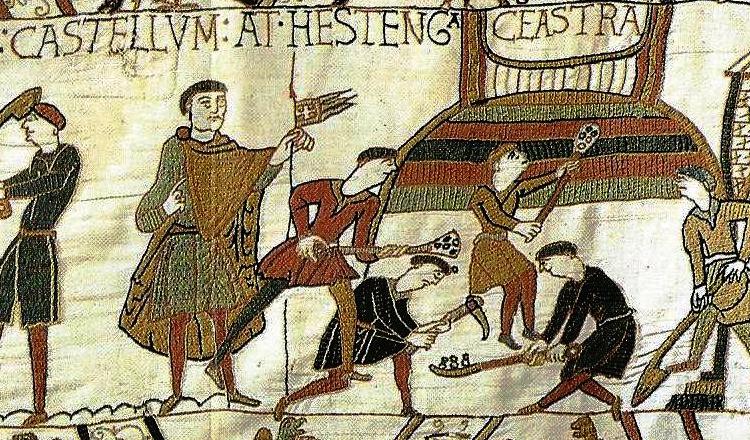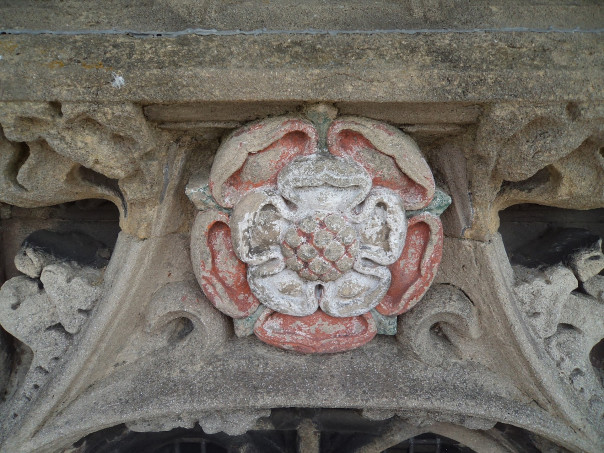Coming up very shortly KAS with CKHH on Tuesday 7 February will be hosting at St Paul’s church, Canterbury CT1 1NH (from 6pm, lecture at 6.45pm), Professor Ken Dark’s lecture entitled: ‘Mission to England: reinvestigating the origins of St. Augustine’s Abbey’.
This will be a great opportunity to hear Professor Dark’s ideas on the early history of what became St Augustine’s Abbey. For the ‘Mission to England’ project – established and directed by the speaker – that began in 2019, has sought to employ 21st-century archaeological methods to enhance our understanding of the origins and earliest development of the site, building on the contributions of all its earlier investigators. The first part of the project’s work, at the chapel of St Pancras, has already identified what may well be the earliest known ‘Anglo-Saxon’ church building in Britain – and the only one which may have been commissioned, consecrated, and used by the leader of the papal mission, St Augustine of Canterbury. To book your free ticket, please use: https://www.eventbrite.co.uk/e/507463315437
Before I come to the main section this week, a taster of the excellent programme we have on offer for you at Tudors & Stuarts 2023, I thought I would mention that this week Dr Diane Heath has her regular ‘Beastly Latin’ online translation group who are gradually working through the medieval animals of the First Family Bestiary and have now reached the Ant. While from my perspective, I have the first of a new series of palaeography online workshops that is a joint venture for the Lossenham Project and local history society members affiliated to Kent Archaeological Society. Additionally, I have a ‘Kent’s Maritime Communities’ project meeting with Dr Craig Lambert and Dr Rob Blackmore.

Moreover, as I mentioned last week, Janet Clayton was due to give the Kent History Postgraduates presentation and she provided a fascinating talk on her analysis of a detailed lay subsidy return from 1301 for a specific Wealden Hundred. These records are highly unusual in terms of their survival, there is a slightly later set for Ivychurch and for this date Janet has been working on the other two survivals from west Kent for her doctorate. However, for the purposes of this presentation, Janet was focusing on certain of the surnames, which for this period predominantly relate to place names or occupations, albeit even at this early period may reflect that of the family in earlier generations rather than the person listed. In fact, surnames are more tricky both in the 14th and 15th centuries than is often acknowledged in the literature. In this case, a particular family name had drawn Janet into investigating those involved in hunting wolves and when and why this might have been significant in the Weald.
Her second line of enquiry related to the apparent presence, as noted by the assessors, of spades, shovels and mattocks in certain of these Wealden households. Bearing in mind such implements were presumably commonplace, Janet is interested in why they may have been recorded here and what this may tell us about occupational specialism and specific industries at this early date. All of this contributed to an extremely interesting presentation and subsequent discussion, and from a personal note, I was pleased to hear that the returns indicate these peasant householders were growing vetch, yes as a fodder crop but equally important concerning soil fertility. Furthermore, the presence of the heavy Wealden clay meant that ox ploughing was seemingly the norm, but there were plough horses noted which again demonstrates the innovative agrarian practices in medieval Kent, not only on the manorial demesne lands, but also on the lands of the tenantry. So thanks very much, Janet, for sharing your research and ideas with us, and similarly to the Kent Postgraduates both in the room and online, and Dr Leonie Hicks for also coming along and reminding us about the presence of depictions of spades and shovels on the Bayeux Tapestry (see above).

For today, I now want to focus briefly on the excellent news that our brilliant speakers for the Tudors & Stuarts 2023 programme are very excited about taking part and that the Weekend is already attracting bookings. The Weekend will run from Friday 28 April to Sunday 30 April and the detailed schedule can be seen at: https://www.canterbury.ac.uk/tudors-stuarts please do have a look because we would be delighted to welcome you (back) to Canterbury, a fantastic medieval and Tudor city in its own right!! Furthermore, the History Weekends are a great way to support postgraduate research into Kent topics because each year we aim to boost the Ian Coulson Memorial Postgraduate Award Fund. I think so far we have aided between 15 and 20 students.
I know I have featured several of the speakers and their talks in the blog last autumn, especially in relation to Kings & Queens – Amy Licence, and Professors Richard Hoyle, Jessica Malay and Maria Hayward, but I thought I would introduce a few more. Listed under War & Politics we have two fascinating lectures and for those interested in the inter-relationship between the two, it is fantastic to be able to welcome back Professor Keith McLay who will shed new light on the fateful and momentous decision made by Bonnie Prince Charlie at Derby in 1745. Equally exciting and exceedingly topical, it will be great to see Dr Craig Lambert again who will be exploring English involvement in the Atlantic slave trade of the late 16th century. Moreover, keeping with this trans-Atlantic theme, we have two further lectures, one within the Social History strand and one under The Church (seeing this as religious history more broadly). Thus, under the former, we are delighted that Dr Ben Marsh will be joining us again, and this time he will be investigating a broad range of commodities, the usual and the unusual, that helped to drive British expansionism into the Atlantic World in the early period of empire-building under the Stuart monarchs. Then under the latter, we are grateful that Professor Alec Ryrie will be coming to Canterbury from Durham to share his extensive knowledge on religious history when he will focus on what he calls “a persistent Protestant missionary dimension” to the imperial projects under Elizabeth and her Stuart successors. For he believes this extends beyond religious history, offering some important truths about the nature of early modern society as a whole.
As you might expect in some ways, our Social History strand is exceedingly large and diverse, and I’ll highlight that next week – watch this space! Moreover, if this has whetted your appetite already, please do check out the CCCU Bookshop’s special web page:
https://bookshop.canterbury.ac.uk/canterbury-history-weekend-2023 and Craig and his team will have a special bookstall during the Weekend in the foyer of Old Sessions House.
 Centre for Kent History and Heritage
Centre for Kent History and Heritage Sheila Sweetinburgh
Sheila Sweetinburgh 1649
1649


Hi. How do I follow your blogs please? You have mentioned several of my Canterbury families I’m very interested in Kents association with the slave trade. It seems several of my families were involved.
Hello Chris, thanks for your comment and there used to be a way, but I’m not sure if it still works so I’ll ask Luke Westhead in Marketing Services here.